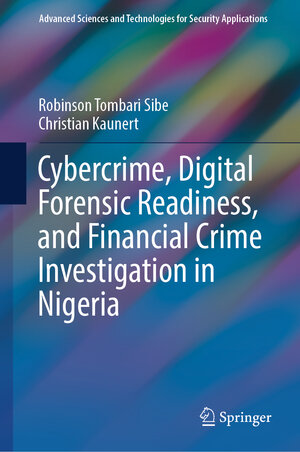
Cybercrime, Digital Forensic Readiness, and Financial Crime Investigation in Nigeria
von Robinson Tombari Sibe und Christian KaunertNigeria has become one of the hotbeds of cybercrime since the liberalization of the telecommunication industry began in 1996. The scale and magnitude have been quite disturbing, not just for Nigeria but also for the international community, given the limitless boundaries of cybercrime. Like any other type of fraud, Internet fraud is primarily driven by financial gains.
This book investigates the extent of the lack of digital forensic resources in Nigeria’s financial crime agencies. It is vital to have a proper resource inventory and capabilities to successfully confront the growing threat of financial crimes. While a few studies have suggested the lack of forensic capabilities in Nigerian cybercrime investigative agencies and the justice system, none have examined this in great detail, particularly in relation to specific skills gaps and resources needed in Nigeria’s financial crime agencies. This book contributes to the growing body of knowledge and clarifies the scope of the lack of digital forensic resources. Understanding the extent of the deficiency and its impact on caseloads could be crucial for developing a roadmap toward building forensic readiness and capability maturity for the agencies. This book presents the deficiencies in forensic readiness and recommends measures to fill this gap.
This book also examines the specifics of the cybercrime caseloads and conviction records in Nigeria, identifying trends and patterns. The book explores other cybercrime complexities in Nigeria, such as common cybercrime taxonomies, prosecution, and conviction dynamics, juxtaposing it with select case studies in other jurisdictions.
Drawing on extensive research, the book offers crucial insights for policymakers, researchers, and the public interested in new trends in cybercrime, digital forensic readiness, Nigerian financial crime agencies, and cybercrime investigations.



